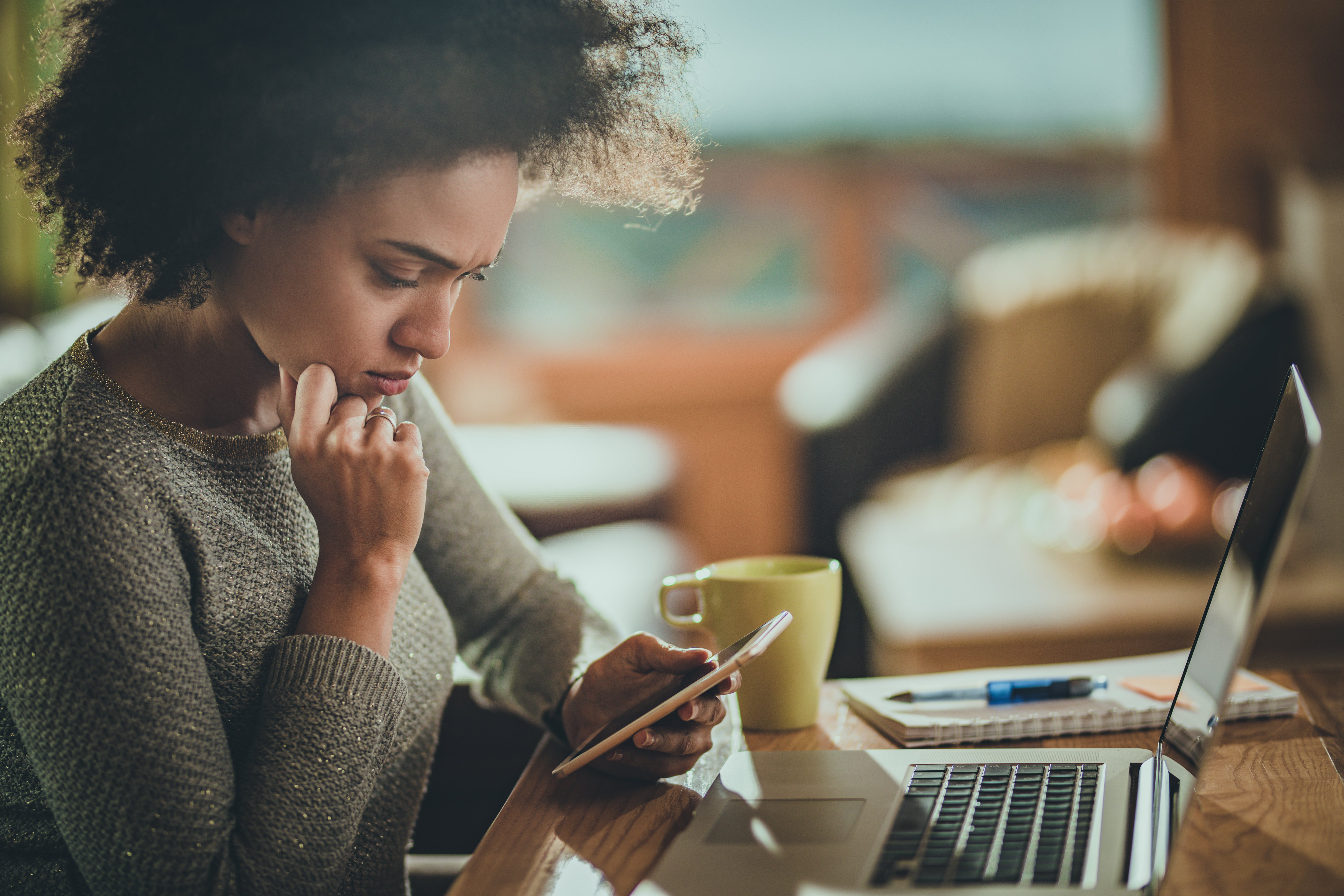As May is Mental Health Awareness Month, it remains important to keep conversations about Black women’s wellness at the forefront in every way possible. Research consistently shows the impact of intersectional oppression on the overall health of Black women. As a result of the competing forces of racism and sexism, Black women are more likely than their white and nonblack counterparts to experience major depressive and general anxiety disorders. There has been a consistent push for us to value healthy eating, exercise and other forms of self-care as necessary paths to maintaining wellness. Yet, as we affirm the importance of those measures and see their benefits, we can’t ignore how difficult mental health moments can be triggered for us on social media.
Social media has connected us like never before. We have benefited from that connection. Some have found love; others found the necessary launchpad for their careers. When it is at its best, the digital space can be a beautiful thing. And then, there are times when it is dark and ugly. As a writer, I’ve learned the importance of not reading the comments left on my public pieces. In the age of public opinion and Twitter fingers, people can be mean. Ignoring and blocking petty comments has become the best way to refuse the internalization of it all. Still, even as I take those steps, I’ve found myself weighed down as I scroll my timelines and consume some of what is considered entertaining and informative.
A recent SNL skit, featuring comedian Leslie Jones as Meghan Markle’s third cousin from Compton, was shared so many times across my timeline I assumed it was hilarious. Instead, I watched as Jones portrayed Markle’s classless cousin participating in etiquette classes in preparation for the royal baby shower. Each time she was in error, her white etiquette instructor slapped and punched her. Nevermind that, in real life, it’s Meghan’s white family members who seem to lack couth and decorum; the assumption here was Meghan’s Black family is not sophisticated enough for royalty. Many found it hilarious how well Leslie Jones played into the tropes of a stereotypical Black woman who needs to be taught by white people how to behave. In a world where images of Black trauma are plentiful, it was amazing how many were amused by abusing a Black woman and no one—including the Black woman in the skit—thought to say otherwise.
Recently, comedian Michael Blackson posted an Instagram video of him caressing a bikini clad white woman with Black women’s curves. His caption read: “My village might get mad but this is what Dr. Martin Luther King fought for.” While that kind of crass humor is on brand for Blackson, his video of his “Nubian queen” reflects the trend that seems to believe trolling Black women is funny. Be clear: Black women don’t care that Black men date white women. We care that Black men use their affection toward white women to demean us. Blackson and any other Black man can parade every white woman they see in our faces; they just look dumb doing it.

Still, it is exhausting to wade through that kind of foolishness when all I want to do is gas my girls up under their selfies, retweet insightful quotes and post my deep thoughts and rants. And when we are not ignoring that, we are suffering fools concerning their views about Black feminism and what it really means to care for Black women. Nothing can get us riled up more than people declaring that single mothers are using child support to glow up, sex positive Black women are hoes and Black feminism is the downfall of our community. We will do a good quote tweet, start a thread and set it off for the culture for at least 30 minutes to an hour! And while setting folks straight, subtweeting passive aggressive folk and chiming in on a trending topic in support of maligned Black women is important, it is always done to our detriment. We are always giving social media spaces our free labor and energy when those same spaces rarely pour back into us.
So how do we remain well? The “funny” skits and Instagram posts poking at us aren’t going to stop but we don’t have to laugh at them. Fake deep and “woke” folk are always going to share their perspectives about Black women that are going to enrage us but we don’t always have to respond. As someone who is learning to guard my mental health with a precious fierceness, I understand the importance of curating a digital space that is conducive to wellness. This means I mute, unfollow and block ignorant and harmful accounts and hashtags. It means I don’t always engage in every trending topic I see. It also means I understand when it’s important to log off for the day and reset my spirit. This doesn’t mean I always get it right but it does mean that I recognize that I must take seriously how I engage in the digital space if I want to always be my best self.
Social media is an important tool. We will never know a world without some form of it in the digital space and, for many, it is an essential part of our work. That is as powerful as it is dangerous. As we continue developing the tools to care best for ourselves, that must include understanding that this space full of potential will not always treat us well and we have do what’s best for us as we navigate it anyway.

